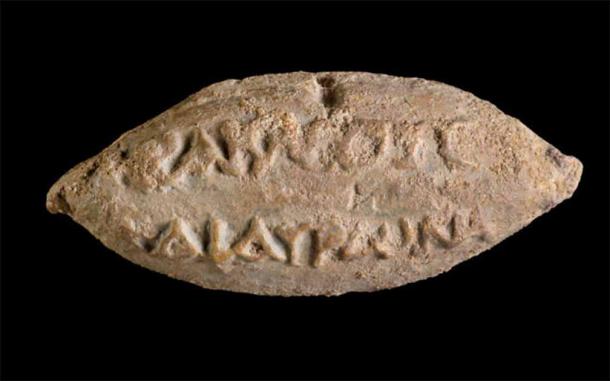A lead sling bullet from the Hellenistic period with a Greek inscription proclaiming victory in battle, has been discovered in Israel. Dated to 2,200 years old, it was excavated in Yavne, and bears the inscription ‘Nike’ on one side and the names of the gods Heracles and Hauronas on the other. The directors of the excavation from the Israel Antiques Authority have remarked that it was possibly related to the conflict between the ancient Greeks and Hasmoneans. In any case, these serve as concrete evidence of a “huge battle” during this period.
The Guardians of Yavne: Hauronas and Heracles
Hauronas and Heracles were the divine patrons of Yavne during the Hellenstic period, and the 4.4 centimeters (1.73 inches) long sling bullet serves as the first archaeological evidence of the two guardians of Yavne. Prior to this, this pair was renowned for their patronage to the Greek island of Delos, but that has since changed, explained Prof. Yulia Ustinova from Ben-Gurion University of the Negev, who deciphered the inscription.

The names of the gods Heracles and Hauron on the reverse side of a sling bullet found in Yavne. (Dafna Gazit/Israel Antiquities Authority)
“The announcement of the imminent victory of Heracles and Hauron was not a call addressed to the deities, but a threat directed towards adversaries,” she added. Heracles (known later as Hercules in Roman mythology) is a legendary Greek hero known for his strength and valor.
The “extremely rare find” was a slingshot bullet thought to be of a Greek soldier, aimed at Jewish Hasmonean troops, reports Times of Israel . The Seleucid army was attempting to Hellenize the Jews, and the Hasmoneans stood in their way .
The researchers have gone on record to state that it is so far conjecture that the ancient bullet belonged to a Greek soldier , and the context in which the slingshot was employed is yet to be fully ascertained. What is certain is that lead sling bullets were indeed known in the ancient world, beginning in the 5th century BC. However, the entirety of the Israel-Levant area has yielded very few individual bullets with inscriptions.
“It seems that we will not be able to know for sure if the sling bullet belonged to a Greek soldier, but it is not impossible that it is related to the conflict between the Greeks and the Hasmoneans,” said Pablo Betzer and Dr. Daniel Varga, who directed the excavation on behalf of the IAA, in the statement.
The Hanukkah Story: Magic, Inspiration, and Divine Salvation
The launched projectile and battle cry, would later become part of the Hannukah story, told even today, surviving in written and oral tradition. The inscription on the bullet was likely an assertion of strength and a means of psychological warfare – to unify the warriors and raise their spirits, scare the enemy, and imbue the outgoing bullet with some magical properties. This has sprinkled into modern times, with messages or slogans frequently inscribed onto ammunition.
Perhaps it was the hope of divine salvation, remarked IAA director Eli Escusido. The discovery was made a year ago, and has been strategically timed to be released just 10 days before this year’s Hannukah.
“In the 2nd century BCE, pagan Yavne – which was an ally of the Seleucids (the Greeks who ruled Eretz-Israel), were subject to attacks by the Hasmonean armies,” the directors explained to The Jerusalem Post . “The Hasmoneans sought to subjugate the other nations and create a homogeneous and ‘pure state’ from a religious-ritualistic point of view,” they added.
Yavne is located 15 miles (24.14 kilometers) south of the capital, Tel-Aviv. The Hasmoneans were a ruling dynasty and members of a priestly class of Jewish rulers and leaders in Judea, during the 1st and 2nd centuries BC, i.e., classical antiquity.
The Yavne excavation is an ongoing large-scale project to extend the frontiers of the city, with the full story of the sling bullet to be presented next Tuesday in a seminar on “Yavne and its Secrets”. It is slated to be held at the Yavne Culture Hall and open to the public free of charge, preceded by an official presentation.
Top image: Ancient bullet showing the side engraved with the Greek word ‘Nike’ meaning ‘victory’ excavated in Yavne . Source: Dafna Gazit/ Israeli Antiquities Authority
By Sahir Pandey
Related posts:
Views: 0
 RSS Feed
RSS Feed

















 December 10th, 2022
December 10th, 2022  Awake Goy
Awake Goy  Posted in
Posted in  Tags:
Tags: 
















